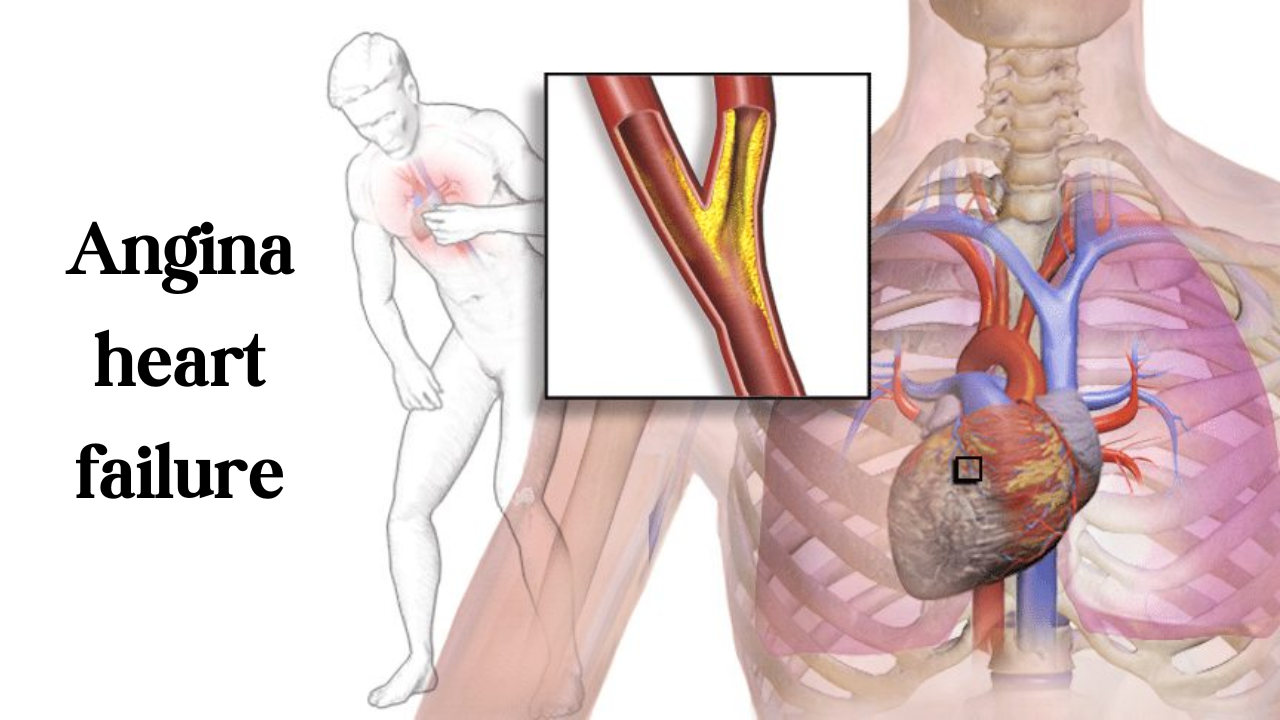Last updated on May 21st, 2025 at 10:08 am
Angina Heart Failure is a serious cardiovascular condition where chest pain from reduced blood flow to your heart (angina) occurs alongside or contributes to heart failure, a state where your heart struggles to pump blood effectively.
Understanding the connection between angina and heart failure is crucial, as they often share common causes like coronary artery disease and hypertension. Prompt diagnosis and treatment of angina and heart failure can improve heart function, ease symptoms, and reduce the risk of life-threatening complications.
What is the Connection Between Angina and Heart Failure?
Angina and heart failure are two serious heart-related conditions that often go hand in hand. While angina refers to chest pain caused by reduced blood flow to the heart, heart failure is a condition where the heart struggles to pump blood effectively. But can angina lead to heart failure? Do they share the same causes? Let’s explore everything you need to know.
Key Differences Between Angina vs. Heart Failure
Knowing the difference between angina and heart failure is essential:
| Feature | Angina | Heart Failure |
|---|---|---|
| Definition | Chest pain due to reduced blood supply to the heart | A condition where your heart can’t pump enough blood |
| Cause | Narrowed or blocked coronary arteries (CAD) | Swelling in the legs, fatigue, and fluid buildup |
| Symptoms | Chest pain, shortness of breath, fatigue | Swelling in the legs, fatigue, and fluid buildup |
| Risk Factors for Each Other? | Angina can lead to heart failure if untreated | Heart failure can worsen angina |
Can Angina Lead to Heart Failure?
Angina is a warning sign that your heart isn’t getting enough oxygen. Over time, untreated angina caused by Coronary Artery Disease (CAD) associated with the left main artery can weaken the heart muscle. This can eventually lead to heart failure as the heart struggles to pump blood efficiently.
How Does This Happen?
- Blocked Arteries (CAD): Plaque buildup in the arteries reduces oxygen supply to the heart, causing angina.
- Heart Muscle Damage: Lack of oxygen weakens the heart, reducing its pumping ability.
- Heart Failure Development: Over time, the heart cannot function properly, leading to heart failure symptoms.
Angina Heart Failure Symptoms
If you experience any of these symptoms, consult your doctor immediately:
Symptoms of Angina:
✅ Chest pain or pressure, especially during exertion
✅ Pain spreading to arms, neck, or jaw
✅ Shortness of breath
✅ Dizziness or nausea
Symptoms of Heart Failure:
✅ Persistent fatigue and weakness
✅ Swelling in legs, feet, or abdomen
✅ Shortness of breath (even at rest)
✅ Rapid weight gain due to fluid buildup
✅ Persistent cough or wheezing
Common Causes of Angina Heart Failure
Several factors contribute to angina and heart failure, including:
- Coronary Artery Disease (CAD): The most common cause of angina and a major cause of heart failure.
- High Blood Pressure: Forces the heart to work harder, increasing the risk of failure.
- Diabetes: Increases plaque buildup in arteries.
- Obesity adds strain to the heart.
- Smoking & Alcohol: Damages heart health over time. (Discover how you can quit smoking with medical therapy)
Best Treatment Options for Angina & Heart Failure
Managing these conditions effectively can prevent complications and improve quality of life.
1. Lifestyle Changes (First Step to Recovery)
✅ Eat a heart-healthy diet (low in saturated fats and sodium)
✅ Exercise regularly (under medical supervision)
✅ Quit smoking and limit alcohol intake
✅ Manage stress levels to avoid heart strain
2. Medications to Control Symptoms
💊 Nitrates: Relieve angina pain by improving blood flow.
💊 Beta-blockers: Reduce heart workload and control blood pressure.
💊 ACE inhibitors: Help the heart pump more efficiently.
💊 Diuretics: Reduce fluid buildup in heart failure.
3. Advanced Treatments (For Severe Cases)
🚑 Angioplasty & Stents: Open blocked arteries in angina patients.
🚑 Coronary Bypass Surgery: Improves blood flow by bypassing blocked arteries.
🚑 Pacemakers or Implantable Devices: Help control heart rhythms.
What You Ask
1. Can you have angina without heart failure?
Angina can occur due to blocked arteries without leading to heart failure. However, persistent angina increases the risk.
2. Can heart failure cause angina?
When the heart fails to pump enough blood, the oxygen supply to the heart muscle is reduced, triggering angina.
3. What is the life expectancy for someone with angina and heart failure?
It depends on overall health, treatment, and lifestyle. Early intervention improves prognosis significantly.
How to Manage Angina and Heart Failure
Both angina and heart failure require early diagnosis, proper treatment, and lifestyle changes for better heart health. If you or a loved one experiences symptoms, don’t ignore them—seek medical advice immediately. What is microvascular Angina?… Learn more in the link.
Take care of your heart, and it will take care of you!




